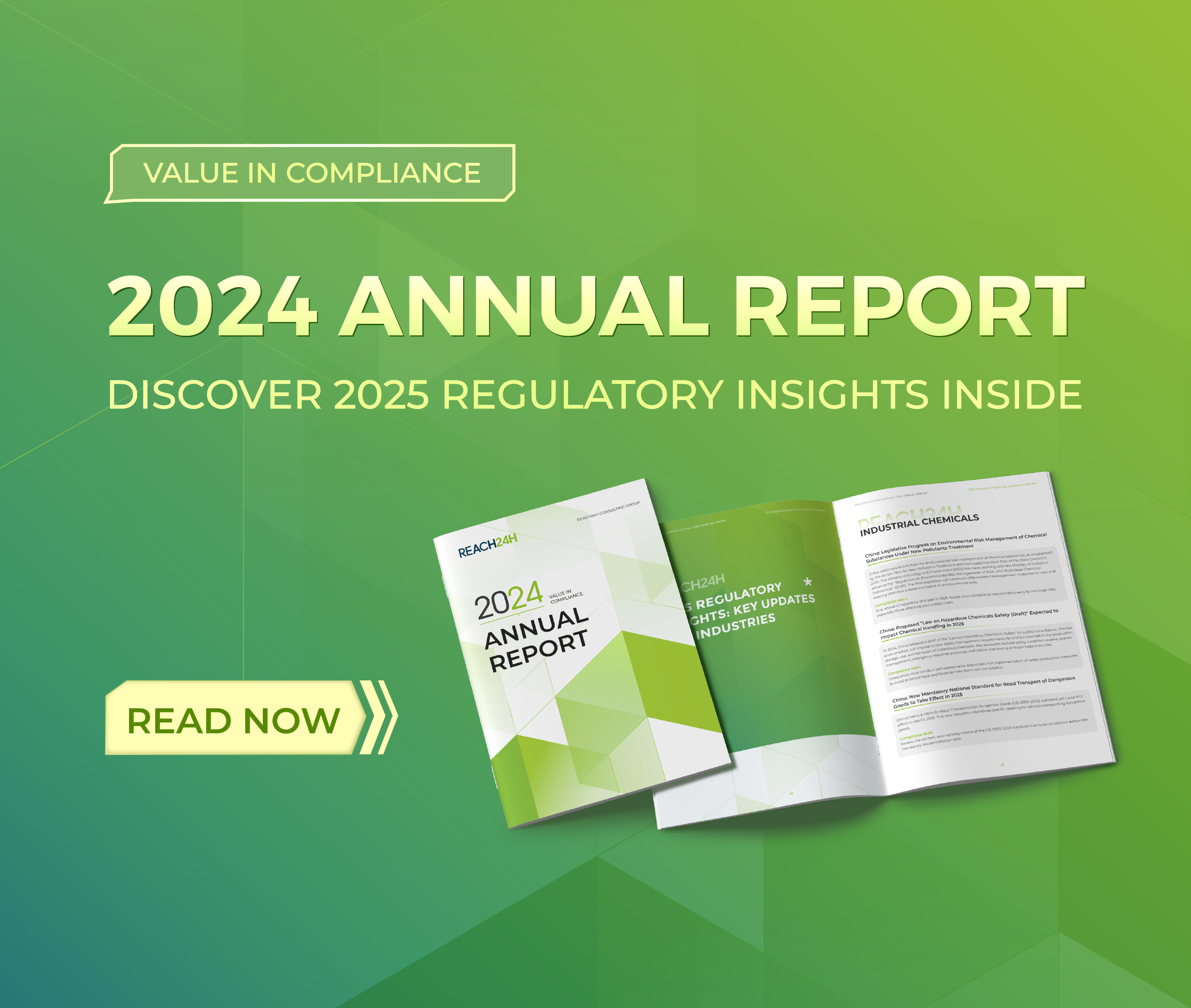China MoARA’s Insights on Pesticide Classification and Scope – Simplifying Registration
Determining whether a substance should be classified under the scope of pesticide regulation is the first step in pesticide registration in China. To accomplish this, companies need to have a comprehensive understanding of China’s pesticide definition and accurately assess their own product’s usage characteristics.
Therefore, REACH24H has compiled recent opinions from the Ministry of Agriculture and Rural Affairs of China (MoARA) on the classification of some commonly confused products within the scope of pesticide regulation. This compilation aims to enhance the understanding of pesticides among businesses and relevant professionals.
Definition and Regulatory Scope of Pesticides
According to Article 2 of the “Pesticide Management Regulations” in China, pesticides refer to substances, mixtures of substances or the formulation, chemically synthesized or derived from biological or other natural sources, used for the prevention and control of diseases, pests, weeds, rodents, and other harmful organisms in agriculture and forestry, as well as for the purposeful regulation of plant and insect growth.
Six Categories of Pesticides
*Based on different purposes and applicable locations.
- Prevention and control of diseases, pests (including insects, ticks, mites), weeds, rodents, mollusks, and other harmful organisms that pose a threat to agriculture and forestry.
- Prevention and control of diseases, pests, rodents, and other harmful organisms in storage and processing facilities.
- Regulation of plant and insect growth.
- Preservation or conservation of agricultural and forestry products.
- Prevention and control of mosquitoes, flies, cockroaches, rodents, and other harmful organisms.
- Prevention and control of harmful organisms that pose a threat to river embankments, railways, docks, airports, buildings, and other locations.
Ministry of Agriculture and Rural Affairs Defining Scope of Pesticide Management
1. Recognition of Picaridin and Diethyltoluamide Products by the General Office of MoARA
In December 2023, the Ministry of Agriculture and Rural Affairs (MoARA) responded to a request from the Qingdao Municipal Bureau of Agriculture and Rural Affairs regarding the “Request for Instructions on Whether the Reported Products Are Managed as Pesticides.” It stated that in China, Icaridin and N, N-diethyl-meta-toluamide (DEET) are widely used as mosquito repellents. According to the “Regulations on Pesticide Management,” products containing these active ingredients and used for mosquito repellent purposes are considered pesticides and should be regulated accordingly. (Source)
2. Fertilizers Labeled with ” 2-(3,4-Dichlorophenoxy)-N, N-diethylethanamine, DCPTA” Belongs to Category of Pesticide Management
In April 2023, the Ministry of Agriculture and Rural Affairs responded to a letter requesting clarification on whether fertilizers labeled with “增产胺” ( 2-(3,4-Dichlorophenoxy)-N, N-diethylethanamine, DCPTA) should be classified as pesticides. According to Article 2, Paragraph 2 of the “Regulations on Pesticide Management,” pesticides include substances or mixtures of substances used to regulate the growth of plants and insects, along with their formulations. The chemical name for “增产胺” is 2-(3,4-dichlorophenoxy)-triethylamine (abbreviated as DCPTA), which can improve the photosynthetic efficiency of plants and enhance their disease resistance as a plant growth regulator.
The product mentioned, labeled as “增产胺 (DCPTA)” with phrases such as “incorporated with DCPTA” and “growth regulation, yield enhancement, stress resistance,” falls within the category of pesticides and should be regulated as such according to the law. (Source)
3. 4-(Trifluoromethyl)nicotinamide should be regulated according to pesticide management.
In January 2023, the Ministry of Agriculture and Rural Affairs issued an opinion on the recognition of 4-(trifluoromethyl)nicotinamide. 4-(trifluoromethyl)nicotinamide is a metabolite of flonicamid and possesses insecticidal activity. The United States and the European Union have included it in the residue definition of flonicamid in food. Some pesticide companies have applied for or obtained patents for insecticidal compositions containing this compound. The target pests for control include mosquitoes, cotton aphids, whiteflies, and rice brown planthoppers, etc. This compound is used for prevention and control of pests that pose a threat to agriculture and forestry. According to Article 2 of the Pesticide Management Regulations, it should be regulated according to pesticide management. (Source)
4. Definition of Cleaning and Disinfectant Products and Pesticide Products
In September 2022, the General Office of the MoARA issued an opinion on whether cleaning and disinfectant products should be classified as pesticides. The opinion states that cleaning products such as laundry detergents, hand sanitizer, drain cleaners, and disinfectant products labeled with claims such as “antibacterial” or “mite-killing” do not fall under the category of pesticides and are not subject to pesticide regulations. (Source)
5. Determination of mosquito repellent products such as “mosquito patches” and “mosquito repellent bracelets” in the category of plant extracts.
In September 2021, the General Office of the MoARA issued an opinion on the determination of mosquito repellent products. The opinion clearly states that any product labeled or described as having mosquito-repellent properties, regardless of whether its active ingredients are chemical or plant-derived, falls within the category of pesticides and should be regulated as such. Therefore, products on the market such as “mosquito patches,” “mosquito repellents,” “mosquito repellent liquids,” “mosquito repellent bracelets,” and similar products that claim to have mosquito repellent properties and are made from plant extract ingredients should be classified as pesticides. (Source)
6. Differentiation and Definition of Veterinary Drugs and Pesticides
In June 2021, the MoARA issued a letter regarding the differentiation and management of veterinary drugs and pesticides. The letter states that the distinction and definition of veterinary drugs and pesticides should be based on the product’s functional purpose, usage scenario, and target protection. If the product’s label, instructions, promotional materials, etc., indicate its use for livestock, poultry, pets, etc., and for the prevention and control of parasites such as lice and fleas to protect the health of animals, then it falls within the category of veterinary drugs and should be regulated accordingly. If the product is indicated for the prevention and control of harmful organisms such as diseases, insects, weeds, and rodents, affecting agriculture and forestry, as well as mosquitoes, flies, cockroaches, ants, and other pests, then it falls within the category of pesticides and should be regulated as such. (Source)
7. Legal Issues of Fertilizer Products Detected with Pesticide Ingredients.
In August 2020, the General Office of the Ministry of Agriculture and Rural Affairs issued a reply regarding the legal issues of fertilizer products detected with pesticide ingredients. The reply states that according to Article 2 of the Pesticide Management Regulations, mixtures of fertilizers and pesticides, including fertilizer products containing pesticide ingredients, should be regulated as pesticides. According to Article 44, Paragraph 2 of the Pesticide Management Regulations, pesticides produced without obtaining pesticide registration certificates should be treated as fake pesticides. (Source)
8. Qualification of Bird Repellents
In October 2020, the General Office of the MoARA issued a letter regarding the qualification of bird repellents. The letter states that according to the definition of pesticides in China, substances or mixtures of substances and the formulations, whether chemically synthesized or derived from biological or other natural substances, that is used in agricultural production and primarily intended to repel birds, are classified as pesticides. For bird repellent products of this kind, if their labels indicate usage for preventing birds, rodents, rabbits, or other animals from biting seeds, seedlings, fruits, and if they are applied through methods such as spraying, seed coating, or broadcast application in the production of crops like rice and wheat, they should be classified as pesticides and regulated in accordance with the relevant provisions of the Pesticide Management Regulations. (Source)
9. Determination of Cyantraniliprole and “CAS 500008-54-8”
In November 2019, the General Office of the Ministry of Agriculture and Rural Affairs issued a determination regarding cyantraniliprole and “CAS500008-54-8.” The determination states that the Ministry of Agriculture and Rural Affairs organized academic experts in the field of pesticides to conduct an evaluation. It was concluded that cyantraniliprole and “CAS500008-54-8″(the National Pesticide Standardization Technical Committee’s tentative Chinese common name “二氯异丙虫酰胺”) are compounds with insecticidal activity disclosed in an international patent published by the U.S. company FMC Corporation (formerly DuPont) in 2003, with patent protection until 2022. China companies have applied for patents to formulate the above compounds with various insecticides for the control of pests such as thrips, diamondback moth, and rice leaf roller. Both substances mentioned above possess biological killing activity and pose risks to humans, animals, and the ecological environment. According to the definition and management provisions of “pesticides” in the Pesticide Management Regulations, when using substances with insecticidal activity for pesticide production, sales, and use, pesticide registration should be obtained in accordance with the regulation. (Source)
Contact REACH24H
Should you have any further inquiries or require additional assistance regarding pesticide registration changes in China, please do not hesitate to contact REACH24H. Our team of experts is well-versed in pesticide regulations and can provide comprehensive guidance and support throughout the registration journey.
- Tel: +86 400 809 5809
- Email: customer@reach24h.com


